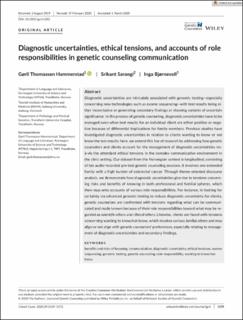| dc.contributor.author | Thomassen, Gøril | |
| dc.contributor.author | Sarangi, Srikant Kumar | |
| dc.contributor.author | Bjørnevoll, Inga | |
| dc.date.accessioned | 2021-04-26T13:35:54Z | |
| dc.date.available | 2021-04-26T13:35:54Z | |
| dc.date.created | 2020-04-17T19:50:14Z | |
| dc.date.issued | 2020 | |
| dc.identifier.citation | Journal of Genetic Counseling. 2020, 29 (6), 1159-1172 . | en_US |
| dc.identifier.issn | 1059-7700 | |
| dc.identifier.uri | https://hdl.handle.net/11250/2739695 | |
| dc.description.abstract | Diagnostic uncertainties are intricately associated with genomic testing—especially concerning new technologies such as exome sequencing—with test results being either inconclusive or generating secondary findings or showing variants of uncertain significance. In the process of genetic counseling, diagnostic uncertainties have to be managed even when test results for an individual client are either positive or negative because of differential implications for family members. Previous studies have investigated diagnostic uncertainties in relation to clients wanting to know or not know the test results; here, we extend this line of research by addressing how genetic counselors and clients account for the management of diagnostic uncertainties vis‐à‐vis the attendant ethical tensions in the complex communicative environment in the clinic setting. Our dataset from the Norwegian context is longitudinal, consisting of ten audio‐recorded pre‐test genetic counseling sessions. It involves one extended family with a high burden of colorectal cancer. Through theme‐oriented discourse analysis, we demonstrate how diagnostic uncertainties give rise to tensions concerning risks and benefits of knowing in both professional and familial spheres, which then map onto accounts of various role responsibilities. For instance, in looking for certainty via advanced genomic testing to reduce diagnostic uncertainty for clients, genetic counselors are confronted with tensions regarding what can be communicated and made known because of their role responsibilities toward what may be regarded as scientific others and clinical others. Likewise, clients are faced with tensions concerning wanting to know/not know, which invokes various familial others and may align or not align with genetic counselors’ preferences, especially relating to management of diagnostic uncertainties and secondary findings. | en_US |
| dc.language.iso | eng | en_US |
| dc.publisher | Published by Wiley Periodicals, Inc. on behalf of National Society of Genetic Counselors. | en_US |
| dc.rights | Attribution-NonCommercial-NoDerivatives 4.0 Internasjonal | * |
| dc.rights.uri | http://creativecommons.org/licenses/by-nc-nd/4.0/deed.no | * |
| dc.title | Diagnostic uncertainties, ethical tensions, and accounts of role-responsibilities in genetic counseling communication | en_US |
| dc.type | Peer reviewed | en_US |
| dc.type | Journal article | en_US |
| dc.description.version | publishedVersion | en_US |
| dc.source.pagenumber | 1159-1172 | en_US |
| dc.source.volume | 29 | en_US |
| dc.source.journal | Journal of Genetic Counseling | en_US |
| dc.source.issue | 6 | en_US |
| dc.identifier.doi | 10.1002/jgc4.1282 | |
| dc.identifier.cristin | 1806876 | |
| dc.description.localcode | © 2020 The Authors. This is an open access article under the terms of the Creative Commons Attribution‐NonCommercial‐NoDerivs License, which permits use and distribution in any medium, provided the original work is properly cited, the use is non‐commercial and no modifications or adaptations are made. | en_US |
| cristin.ispublished | true | |
| cristin.fulltext | original | |
| cristin.qualitycode | 1 | |

